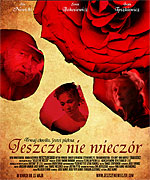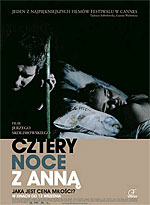I spent much of the end of July attending the 9th Era New Horizons film festival in Wrocław, Poland, where I was simultaneously covering it for Sight & Sound and sitting on the five-strong jury for the New Polish Films competition. There were thirteen entries (all feature-length Polish fiction films released after 31 July 2008) and two prizes – the Wrocław Film Prize for the best film, and the Best New Director Prize for the best debutant(e). That occupied much of my time in Wrocław, but I also caught up with a handful of other titles, notably the new Andrzej Wajda, Sweet Rush (Tatarak) and Igor Mayboroda’s documentary Rerberg and Tarkovsky: The Reverse Side of ‘Stalker’ (Рерберг и Тарковский. Обратная сторона ‘Сталкера’) – though the bulk of my spare time was spent gorging myself on a mouthwatering programme of classic Hungarian films from the 1960s and 1970s, many of which I’d never had the chance to see before in any medium, let alone the big screen. I’ll be writing about those in more detail over the next few days, but first here’s a quick four-part roundup of the New Polish Films competition.
 Before Twilight (Jeszcze nie wieczór, d. Jacek Bławut, 2008).
Before Twilight (Jeszcze nie wieczór, d. Jacek Bławut, 2008).
This is nominally the fiction feature debut of veteran documentarist and cinematographer Jacek Bławut, but it turned out to have a fair bit in common with his earlier work, especially The Abnormals (Nienormalny, 1990), a documentary study of a home for mentally disadvantaged children preparing for an end-of-term concert. Before Twilight has a similar premise, albeit at the other end of man’s seven-age scale, being set and filmed in the Veteran Actors’ Home in Skolimowo – most of whose onscreen inhabitants are played by actual former Polish stage and screen stars. The script was augmented by much improvisation, and Bławut subsequently admitted that many of the best moments were contributed by happenstance (especially the relationship between lead actor Jan Nowicki and a large black poodle called Mefi – short for Mephistopheles – which provides many of the comedy highlights). The narrative sees Nowicki’s character Jerzy arriving at the home and galvanising its residents, regardless of frailty, into performing an ambitious version of Goethe’s ‘Faust’ in the local prison (also genuine). While this occasionally topples into melodrama, with reluctant actors having to be goaded into making one last appearance before life’s final curtain, and one of them inevitably dropping dead onstage immediately after his climactic speech, this is offset by a stream of beautifully-observed caught-on-the-wing moments. Like Bławut’s other films, chiefly those made after he replaced self-consciously stylised cinematography for fly-on-the-wall unobtrusiveness, it’s scrappy but heartfelt, and certainly one of the competition’s most straightforwardly enjoyable films.
 The Forest (Las, d. Piotr Dumała, 2009)
The Forest (Las, d. Piotr Dumała, 2009)
There were few films in the competition that I wanted to like more than the live-action feature debut of Piotr Dumała, one of the most distinctive animation talents to have emerged in Poland in the last three decades, which is saying something (Łagodna, his crepuscular adaptation of Dostoyevsky’s ‘A Gentle Spirit’, is arguably superior to Une Femme douce, Robert Bresson’s better-known 1969 version). Certainly, if the Era New Horizons festival had a cinematography prize, Adam Sikora would have won it hands down. Almost any random frame of The Forest could be enlarged and displayed as a fine-art photographic masterpiece: the forest exteriors are imbued with the same mysterious potency as a Tarkovsky dream sequence, while the spartan interiors show the same meticulous attention to composition, lighting and set decoration, a chamber pot is lit with the same loving care as the human face. But unsympathetic performances from both leads (Stanisław Brudny as the elderly, bed-ridden father, Mariusz Bonaszewski as his son, whose fractious relationship drives the film) ended up precluding what I assume was the intended emotional involvement – although dialogue is kept to an absolute minimum, it might have been more effective with none at all. But Dumała remains a major talent (an animated prologue supplies a handy reminder of where his reputation springs from), and I’ll be first in the queue to see whatever he comes up with next.
 Four Nights with Anna (Cztery noce z Anną, d. Jerzy Skolimowski, 2008)
Four Nights with Anna (Cztery noce z Anną, d. Jerzy Skolimowski, 2008)
After a 17-year absence from the cinema (and a rather longer break from Polish cinema, its exact length depending on whether you date it from the 1967 or 1981 version of Hands Up!/Ręce do góry), the veteran master Jerzy Skolimowski returned with one of the competition’s strongest films. Leon (Artur Steranko) is a classic Skolimowski protagonist in the vein of Mike in Deep End (1970) or Nowak in Moonlighting (1982): a painfully introverted middle-aged man who finds solace in brain-numbing routine (he works in a hospital crematorium), whose chance encounter with rape victim Anna (Kinga Preis) many years earlier turned his life upside down. Wrongly convicted of the crime, his warped but strangely understandable idea of atonement is to break into Anna’s bedroom (having previously drugged her evening drink) on four consecutive nights. The reasons for this are initially unclear thanks to the film’s disorientating flashback structure, but gradually coalesce into one of the most powerful depictions of a love that dare not speak its name that anyone has attempted in cinema in recent years: superficial comparisons with Krzysztof Kieślowski’s A Short Film About Love (Krótki film o miłości, 1988) largely miss the point. Steranko’s astonishing performance is augmented by Skolimowski’s subtle, precise film language, showing little sign of rust after the long layoff. In particular, spoken dialogue is kept to an absolute minimum – Skolimowski apparently wanted even less, but conceded that the interrogation and trial scenes could hardly be conducted in mime.
Nice post. Here is my summary of the festival you mentioned: Era New Horizons 9 Film Festival – impressions.
Btw I also encourage you to try Filmaster as a place to rate movies, write short reviews and get recommendations. Feel invited :)